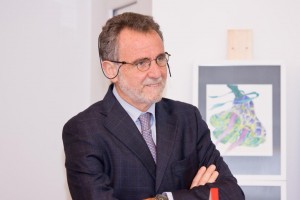Honorary doctors
Honorary doctors
Lynn McAlpine (2025)
 is a pioneering expert in the field of formal and experiential workplace learning. Over more than three decades of research and academic development, she has gained international recognition for her contributions, particularly in highlighting the impact of experiential learning on both university students and professionals beyond academia. In the past 15 years, her research has focused on doctoral and postdoctoral career trajectories both within and outside academia, with her findings being integrated into higher education policies and strategies globally. She obtained her degrees in educational sciences from McGill University and Concordia University, completed her Ph.D. at the University of Toronto, and later returned to McGill as a postdoctoral fellow. From 2006 to 2010, she led the Oxford Centre for Higher Education Pedagogical Development, and, from 2011 to 2016, she served as Director of Research at the Oxford Learning Institute. She has led or co-led over 45 international research projects and is the author or co-author of 300 scholarly publications, including studies, books, and book chapters. Her contributions were recognized with awards from the American Educational Research Association in 2005 and the Canadian Society for the Study of Higher Education in 2006. She currently holds emeritus professorships at McGill and Oxford Universities and has been awarded an honorary doctorate by Université Laval in Canada. She has maintained a long-standing collaboration with the Institute for Adult Education, Research, and Knowledge Management at ELTE, facilitating major research partnerships within the faculty. In 2023, she played a key role in organising the first higher education pedagogy conference in Budapest, where she also served as a plenary speaker.
is a pioneering expert in the field of formal and experiential workplace learning. Over more than three decades of research and academic development, she has gained international recognition for her contributions, particularly in highlighting the impact of experiential learning on both university students and professionals beyond academia. In the past 15 years, her research has focused on doctoral and postdoctoral career trajectories both within and outside academia, with her findings being integrated into higher education policies and strategies globally. She obtained her degrees in educational sciences from McGill University and Concordia University, completed her Ph.D. at the University of Toronto, and later returned to McGill as a postdoctoral fellow. From 2006 to 2010, she led the Oxford Centre for Higher Education Pedagogical Development, and, from 2011 to 2016, she served as Director of Research at the Oxford Learning Institute. She has led or co-led over 45 international research projects and is the author or co-author of 300 scholarly publications, including studies, books, and book chapters. Her contributions were recognized with awards from the American Educational Research Association in 2005 and the Canadian Society for the Study of Higher Education in 2006. She currently holds emeritus professorships at McGill and Oxford Universities and has been awarded an honorary doctorate by Université Laval in Canada. She has maintained a long-standing collaboration with the Institute for Adult Education, Research, and Knowledge Management at ELTE, facilitating major research partnerships within the faculty. In 2023, she played a key role in organising the first higher education pedagogy conference in Budapest, where she also served as a plenary speaker.
You can read our interview (“Teaching is trying to facilitate change, because learning is change”) with Professor McAlpine here.
KRISTIE LONG FOLEY (2024)

works at Wake Forest University, USA: she is the founder and head of the Department of Implementation Science, professor at the Department of Social Sciences and Health Policy, and currently Vice Dean for Research Strategy and Integration. Her main area of interest is the practical application of healthcare and public healthcare scientific methods, strategies and knowledge, with her research in particular focusing on the connection between social differences and psycho-social interventions in the prevention, screening and treatment of cancer. In Hungary, Professor Foley’s work has been highly influential in laying the foundation for research on smoking and for developing interventions. For the last two decades, she has maintained a close working relationship with ELTE-affiliated and other local researchers; several co-authored publications have resulted from these collaborations. Professor Foley’s involvement provides immense help towards the development and the grant activity of the Institute of Psychology and the academic field of health psychology and health science in general.
You can read our interview (“Strategies and applications in public healthcare”) with Professor Foley here.
GIAN VITTORIO CAPRARA (2023)
 is a world-renowned and one of the most cited contemporary European representatives of personality psychology, and Professor Emeritus at La Sapienza University in Rome. His outstanding academic work is marked by nearly 600 scientific publications and 20 summarizing and research volumes. In his seminal works, Professor Caprara interprets personality as a hypercomplex system that is shaped by genetic, temperamental and environmental factors alike. One of his research focuses is to examine the role of personality in influencing political, social and economic processes. He places special emphasis on ensuring the practical applicability of his theories in various disciplines in the human sciences. He has further enriched the methodological toolbox of personality psychology with the development of original methods of assessment: he developed instruments for measuring positive psychology and the well-being sciences. Since the 1980s, Professor Caprara has been involved in ongoing research and consultation with researchers at the Institute of Psychology at ELTE. More recently, the PPK Positive Psychology Research Group has been conducting research under his direction to test the applicability of the Positivity Scale in Hungary.
is a world-renowned and one of the most cited contemporary European representatives of personality psychology, and Professor Emeritus at La Sapienza University in Rome. His outstanding academic work is marked by nearly 600 scientific publications and 20 summarizing and research volumes. In his seminal works, Professor Caprara interprets personality as a hypercomplex system that is shaped by genetic, temperamental and environmental factors alike. One of his research focuses is to examine the role of personality in influencing political, social and economic processes. He places special emphasis on ensuring the practical applicability of his theories in various disciplines in the human sciences. He has further enriched the methodological toolbox of personality psychology with the development of original methods of assessment: he developed instruments for measuring positive psychology and the well-being sciences. Since the 1980s, Professor Caprara has been involved in ongoing research and consultation with researchers at the Institute of Psychology at ELTE. More recently, the PPK Positive Psychology Research Group has been conducting research under his direction to test the applicability of the Positivity Scale in Hungary.
You can read our interview (“There is a great need of true knowledge at service of the common good”) with Professor Caprara here.
HUNYADY GYÖRGY (2022)
 is regarded the founding father of social psychology in Hungary and was instrumental in introducing generations of young ELTE researchers into the international mainstream of the discipline. His main research areas are social cognition, social relations, national consciousness, social well-being and the public mind, and counter-selection. His comprehensive monograph (Stereotypes in the Shifting Public Mind) was the basis for several subsequent researches, while his oeuvre was later completed with publications on political, legal and economic psychology. Professor Hunyady has been teaching at ELTE since 1977 and was conferred the title of professor in 1988. He was Head of the Department of Social and Educational Psychology for decades, and he led the Department, later Institute, of Psychology at ELTE from 1993 to 2007. He was Dean of the ELTE Faculty of Humanities from 1989 to 1992 and founding Dean of the ELTE Faculty of Education and Psychology from 2003 to 2007. He still takes on an active role in the doctoral programmes at PPK. In 2001, Professor Hunyady was elected member of the Hungarian Academy of Sciences. He has authored hundreds of scientific monographs, studies, articles and textbooks. He is the founder of the Hungarian Journal of Applied Psychology, and was the president of the editorial board of the Hungarian Journal of Psychology from 2016.
is regarded the founding father of social psychology in Hungary and was instrumental in introducing generations of young ELTE researchers into the international mainstream of the discipline. His main research areas are social cognition, social relations, national consciousness, social well-being and the public mind, and counter-selection. His comprehensive monograph (Stereotypes in the Shifting Public Mind) was the basis for several subsequent researches, while his oeuvre was later completed with publications on political, legal and economic psychology. Professor Hunyady has been teaching at ELTE since 1977 and was conferred the title of professor in 1988. He was Head of the Department of Social and Educational Psychology for decades, and he led the Department, later Institute, of Psychology at ELTE from 1993 to 2007. He was Dean of the ELTE Faculty of Humanities from 1989 to 1992 and founding Dean of the ELTE Faculty of Education and Psychology from 2003 to 2007. He still takes on an active role in the doctoral programmes at PPK. In 2001, Professor Hunyady was elected member of the Hungarian Academy of Sciences. He has authored hundreds of scientific monographs, studies, articles and textbooks. He is the founder of the Hungarian Journal of Applied Psychology, and was the president of the editorial board of the Hungarian Journal of Psychology from 2016.
You can read our interview with Professor Hunyady (“I am interested in the psychological consequences of historical changes”) here.
MARC NICHOLAS POTENZA (2019)

psychiatrist, addictologist, founder and leader of several research groups at Yale University. He has been researching addictive behaviours and disorders for over twenty years, dependence on psychoactive substances and gender differences in processes. The researcher-clinician researches the intergenerational aspects of addiction, including drug exposure in the prenatal stage, his work includes the study of impulsive and compulsive disorders, the study of video game addictions, and the topic of hypersexuality. He has been working closely with the Department of Clinical Psychology and Addiction of the Faculty of Pedagogy and Psychology for many years. Participated in the founding of the Journal of Behavioral Addictions, one of the leading journals of addiction studies, at ELTE in 2011, in addition to faculty members, several doctoral students have been successfully involved in his research projects.
You can read „In the footstep of modern addictions” interview here.
JOSÉ JACKSON COELHO SAMPAIO

rector of Ceara State University. Throughout his scientific career, he was guided by the innermost essence of the medical profession, the imperative of humanistic care, which can be easily discovered even in his extensive educational activities. He has worked as a psychiatrist in several institutions across the country, during which he gained considerable experience, then took a leading role in the historical process of reforming Brazilian psychiatry. The topics of his researches and publications are in the fields of epidemiology, health policy and mental health. As a rector of his university, he lays great emphasis on the development of technology and innovation as well as on international relations, such as the establishment of a department responsible for the teaching of the Hungarian language and culture, which is the second such institution in Brazil
AVIV MAKIEL WEINSTEIN

head of the Center for Integrative Brain Science at Ariel University. In the past 20 years, Professor Weinstein has performed internationally appreciated researches in studying the use of imaging in the psychological, psychopharmacological and neurobiological operations of the nervous system and its applications in the treatment of people having addiction problems. His research included an examination of the psychological and neurophysiological components of craving and withdrawal. Establishing the first brain research laboratory applying imaging techniques in Israel can also be related to professor Weinstein’s name. Here, they examine the effects of psychoactive drugs, such as ecstasy and cannabis, on the cognitive and motoric functions of the users. His scientific interest reflects the signs of the times: his research of behavioural addictions covers gaming, compulsive buying, hypersexual behaviour and exercise dependence.
MARK D. GRIFFITHS

he is a member of the British Psychological Society. His professional interest focuses on behavioural addictions, mainly on the problem of gambling and videogame addictions. He is one of the major researchers of the topic and has published over 630 refereed papers, five books and over 150 book chapters. He has also acted as a consultant for the governmental body in Norway, and participated at the US National Gambling Impact Commission. His relationship with our university is based not only on mentoring our PhD students, but we have also developed further cooperation and teacher exchanges between our universities due to his sustained collaborative contribution.
HEINZ-ELMAR TENORTH

professor and head of department at the Humboldt University in Berlin, Professor Emeritus since 2003, an internationally renowned personality in education, specializes in historical pedagogy. He has nearly two decades of professional cooperation with ELTE, in addition to the scientific history of education, the joint research work focused on various pedagogical historical anthropological topics, as well as on the comparative historical-pedagogical study of the teaching profession. Professor Tenorth also played a significant role in the methodological foundation of educational history research focusing on international reception effects at the department.
FERDINAND KLEIN

professor Emeritus of the University of Ludwigsburg-Tübingen, Honoris Causa doctor and professor at Eötvös Loránd University. One of the most prominent representatives of special education in German, member of the great post-war generation of scientists who have made a significant contribution to the creation of a methodological basis for modern special education in theory building, to carry out comprehensive basic research, to outline the first theoretical paradigms. He has also pioneered system-building activities in several practical areas, for example, the development of pedagogical care for the severely and cumulatively disabled. He is one of the most-cited authors in the German-language literature. His career as a university teacher is marked by the organization and development of several special education courses, in universities which are now considered among the most prestigious schools.
WIM VAN DEN BRINK
 professor at the University of Amsterdam, since 2002 he works in close cooperation with the Institute of Psychology of the Faculty of Education and Psychology of Eötvös Loránd University, which has resulted in several joint publications, in addition, he was involved in the work of several doctoral students. He gave guest lectures on our faculty several times and hosted student at the University of Amsterdam. He has received many prestigious awards and honours throughout his career, his scientific public activities are diversified, he is the member of the editorial boards of several prestigious journals. His main scientific interests are related to the neurobiology of substance use disorders and behavioural addictions, the pharmacological treatment of substance use disorders and related comorbidities, and the reduction of stigma regarding patients with addiction.
professor at the University of Amsterdam, since 2002 he works in close cooperation with the Institute of Psychology of the Faculty of Education and Psychology of Eötvös Loránd University, which has resulted in several joint publications, in addition, he was involved in the work of several doctoral students. He gave guest lectures on our faculty several times and hosted student at the University of Amsterdam. He has received many prestigious awards and honours throughout his career, his scientific public activities are diversified, he is the member of the editorial boards of several prestigious journals. His main scientific interests are related to the neurobiology of substance use disorders and behavioural addictions, the pharmacological treatment of substance use disorders and related comorbidities, and the reduction of stigma regarding patients with addiction.
JOHN T. JOST
 he is one of the most widely known, most published, and most decisive political psychologists in the world today. He earned his degree in psychology from Duke University in 1989 and received his PhD at Yale University in 1995. He has been a professor at New York University since 2003. He is the author of seven books and nearly 400 publications, with over 60,000 citations. He developed the Theory of System Justification, according to which people are motivated to defend, explain, and maintain the current social, economic, and political system for their sense of certainty, security, and shared reality. His most cited study explores the processes of motivated social cognition that define political conservatism. Since 2010, he has been working closely with the staff of the Department of Social Psychology at ELTE, which resulted in several joint publications, and he was a guest lecturer at the Faculty of Education and Psychology on several occasions. Intense cooperation with him has considerably fostered the development of the study of social psychology and the international collaboration activities of the Faculty.
he is one of the most widely known, most published, and most decisive political psychologists in the world today. He earned his degree in psychology from Duke University in 1989 and received his PhD at Yale University in 1995. He has been a professor at New York University since 2003. He is the author of seven books and nearly 400 publications, with over 60,000 citations. He developed the Theory of System Justification, according to which people are motivated to defend, explain, and maintain the current social, economic, and political system for their sense of certainty, security, and shared reality. His most cited study explores the processes of motivated social cognition that define political conservatism. Since 2010, he has been working closely with the staff of the Department of Social Psychology at ELTE, which resulted in several joint publications, and he was a guest lecturer at the Faculty of Education and Psychology on several occasions. Intense cooperation with him has considerably fostered the development of the study of social psychology and the international collaboration activities of the Faculty.

